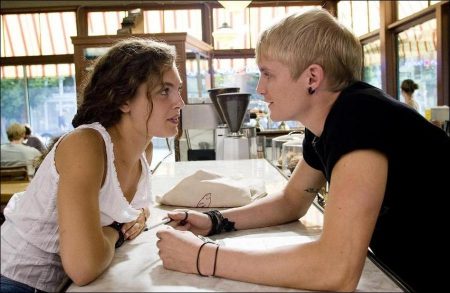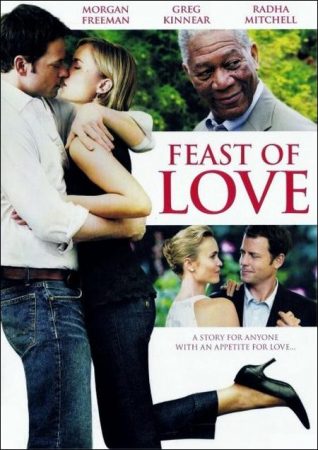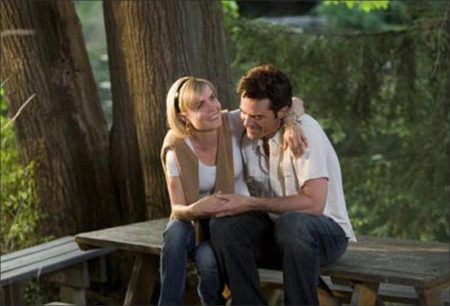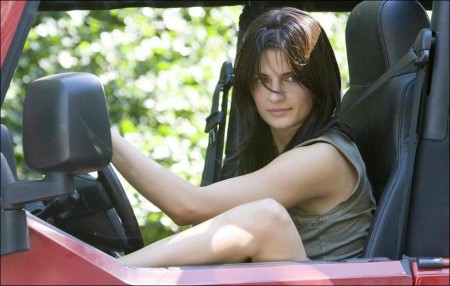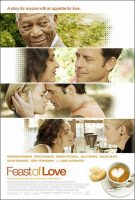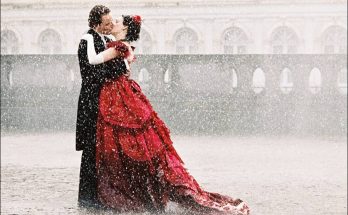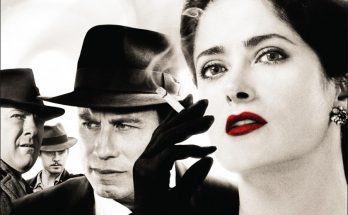Tagline: A story for everyone with an appetite for love.
In a coffee shop in a tight-knit Oregon community a local professor and writer Harry Stevenson (Morgan Freeman) witnesses love whipping up mischief among the town’s residents. Among young and old, among both parents and lovers, among the sweet and the savage, among humans and even animals, Harry watches in awe as love mystifies, wounds, devastates, inspires, makes unreasonable demands and profoundly shapes the lives of everyone around him – including himself.
From the die-hard romantic coffee shop owner Bradley (Greg Kinnear) who has a serial habit of looking for love in all the wrong places, including with his current wife Kathyrn (Selma Blair); to the edgy real estate agent Diana (Radha Mitchell) who is caught up in an affair with a married man (Billy Burke) with whom she shares an ineffable connection; to the beautiful young newcomer Chloe (Alexa Davalos) who defies fate in romancing the troubled Oscar (Toby Hemingway); to Harry himself, whose adoring wife (Jane Alexander) is looking to break through his wall of grief after the wrenching loss of a loved one… All of these strands intertwine into one epic love story in which no one can escape being bent, befuddled, delighted and ultimately redeemed by love’s inescapable spell.
Feast of Love is a 2007 American drama film directed by Robert Benton, starring Morgan Freeman, Greg Kinnear, Radha Mitchell, Billy Burke and Selma Blair. The film, based on the 2000 novel The Feast of Love by Charles Baxter, was first released on September 28, 2007, in the United States.
In its opening weekend, the film grossed US$1.7 million in 1,200 theaters in the United States and Canada, ranking #12 at the box office. It grossed a total of US$5.4 million worldwide – US$3.5 million in the United States and Canada and US$1.9 million in other territories.
Introducting Characters<-h4>
The movie deals with love and its various incarnations, set within a community of friends in Portland, Oregon. Harry Stevenson provides narration about how love can affect one’s life.
Bradley
Bradley runs a small cafe in Portland. He has been married to his wife Kathryn for 6+ years. However, their marriage becomes strained. Soon enough Kathryn begins a lesbian relationship with a woman, Jenny, whom she meets playing softball, and leaves Bradley. The divorce affects Bradley greatly, but he soon finds love again in Diana, a realtor who also has a past with a married man named David. Though she ends her affair with David to marry Bradley, they ultimately declare they are in love with each other and Diana leaves Bradley, again devastating him. Now twice divorced, Bradley suffers a mini-breakdown and stabs himself in the hand. As he is getting stitched up in the hospital he falls for his doctor, Margit. In the film’s conclusion the two are revealed to marry.
Oscar and Chloe
Oscar is a young man working at Bradley’s cafe who soon meets and falls in love with a girl named Chloe. However, Oscar is revealed to be living with his alcoholically abusive father, Bat. When Chloe visits a fortune-teller, she is told that Oscar will die. Chloe, though upset at first, straightens her resolve about her love for Oscar and their future together. Coming home, she urges Oscar to get married to her immediately.
At the wedding, Chloe reveals to Harry that she is pregnant, and plans to have another baby right after due to Harry’s advice of having “two.” In the film’s conclusion everybody gathers for an afternoon in the park. While playing football, Oscar collapses; despite an attempt to get him to a hospital, congested traffic interferes, and he dies of a heart defect. Bat attempts to avenge his son’s death by harming Chloe but Harry scares him off, and then asks Chloe if he and his wife Esther can ‘adopt’ her as their own.
Diana and David
Diana is a successful realtor and has been carrying on an affair with the married David. Though she asks him numerous times to leave his wife of 11 years, Karen, he cannot bring himself to do it. Their relationship becomes even more volatile when Diana begins dating Bradley and falls in love with him. David insists he loves Diana, but is unable to leave his wife. Diana marries Bradley and ends her affair with David. However, their love is later rekindled when Karen discovers her husband was cheating, leaving him. Free at last, David and Diana have an emotional confrontation in the park that ends with a kiss that Bradley sees, fueling their divorce and Bradley stabbing himself. In the film’s conclusion Diana and David are shown as a public and functionally happy couple.
Harry and Esther
Harry and his wife Esther have been married a long time. Harry is a patron at Bradley’s cafe and often provides the younger generation with advice on love. However, it is revealed that Harry and Esther are masking their own grief after the death of their adult son, Aaron. Harry reveals the nature of his son’s death to Chloe, whom he and Esther grow very close to. Harry has also been struggling with the decision of going back to work as a professor at a university. In the film’s conclusion, after Oscar’s death, Harry and Esther offer to adopt a now widowed and pregnant Chloe, who tearfully accepts their offer.
Mischief, Mayhem and Mystery
Director Robert Benton, who celebrates love’s astonishing variety of forms in FEAST OF LOVE, is no stranger to chronicling the mischievous inner workings of the heart – though he has never done so in such a magical and unabashedly passionate story before. Benton began his Hollywood career by co-writing the classic 1960s bank robber romance “Bonnie and Clyde,” garnering the Academy Award in his feature film debut, and influencing countless edgier love stories to come.
He would go on to win another Oscar, a decade later, for directing the quintessential divorce drama/comedy “Kramer vs. Kramer” (for which he also received a Best Screenplay Adaptation nomination), which navigated the treacherous territory of what happens when love falls apart. He then won a third Academy Award for the original screenplay for the Depression-era, “Places In The Heart;” this time exploring the complexities of family love, which also garnered him an Oscar nomination for Best Director.
Given Benton’s career-long fascination with the different kinds and consequences of love, few directors could have seemed better suited to tackle Charles Baxter’s critically praised breakout novel about the wondrous totality of all of love’s forms. In his novel, the awardwinning Baxter unleashed a kind of “Midsummer Night’s Dream” on modern suburbia, following the intersecting paths of both true love and romantic folly that fuel and bind a community behind its closed doors.
The book was filled with young lovers finding safety in one another, unexpected lovers tumbling into one another’s arms, illicit lovers playing with danger, parents seeking solace for the love of lost children, lost children seeking out parental love, and most of all, the author’s search for just how it is that our troublesome, agonizing hearts also see us through life with so much grace and beauty. The result was a story that was not only funny and sensuous, but that gave readers a rich sense of the human interconnectedness that anchors us all.
In The New York Times, Jacqueline Carey wrote of the book: “Charles Baxter shows us the hard-won generosity of spirit that day-to-day dealings with other human beings require. He builds a community right on the page before us, using a glittering eye, a silvery tongue – and just a little moonlight.”
Among the book’s many great admirers were renowned producers Tom Rosenberg and Gary Lucchesi of Lakeshore Entertainment. Rosenberg and Lucchesi have long had a penchant for pairing remarkable literary works with great filmmakers, and in 2005 garnered the Academy Award for Best Picture with the acclaimed “Million Dollar Baby,” directed by Clint Eastwood, screenplay by Paul Haggis, based on a short story by F.X. Toole.
Rosenberg could not resist Baxter’s vast, unflinching way of tackling perhaps the most complex, enigmatic and vital of human subjects. “FEAST OF LOVE is about life,” he says. “In the novel, I think Charles Baxter basically suggests that love is life’s most meaningful experience and you have to seek it out and remain true to it, no matter what happens – and that became the powerful idea that drove the film.”
For Lucchesi, the core of the film was deeply personal right from the start. He says, “FEAST OF LOVE embraces the journey of life, and how life and love walk together. I’m 51 years old. I’ve been married 28 years. I don’t know how you get through life if you don’t have an emotional side being satisfied. I can tell you that a Saturday morning sitting in my kitchen having a cup of coffee with my wife really pleases my heart – and I think what’s so wonderful about FEAST OF LOVE: it celebrates those sort of unheralded emotional moments that keep us going.”
Lucchesi was also drawn to the profound universality of the story, traversing as it does through so many different kinds of entwinings – from friends to lovers to life-long spouses to family relationships. “It’s always quite fascinating to see how love and relationships evolve through the years and in this movie we have three different generations of relationships, and many different kinds of relationships as well, which makes the story so relatable no matter who you are,” he says.
Rosenberg and Lucchesi were so in love with FEAST OF LOVE that they knew the adaptation from page to screen would, by rights, become a careful, delicate process. They also realized right from the start it would not be an easy task. To begin with, Baxter’s story is filled with a wide array of characters, each of whom has his or her own stylistically distinctive story to tell.
Anchoring the modern fable is Harry Stevenson, the grieving philosophy professor whose keen perspective on the people around him doesn’t always extend to himself. Harry, in turn, watches as his younger friend Bradley Smith finds himself trapped in a wild roller-coaster of repeated blind bliss followed by rejection. When Bradley’s wife Kathryn leaves him for another woman, Bradley throws himself into a rebound relationship with Diana, a supposed “anti romantic” real estate agent who just can’t seem to stop her ongoing affair with David, a married man. Meanwhile, for Chloe and Oscar, the young couple who work as baristas in Bradley’s coffee shop, love is all about living in the fierce passion of the moment. But their hoped-for future is threatened by Oscar’s violent, abusive father, Bat, and overshadowed by a psychic’s dark prediction.
In Baxter’s novel, he uses himself as a character to weave all these people and their vignettes together into a tapestry bursting with color, insight and razor-sharp wit. But when screenwriter Allison Burnett came on board, he realized he had his hands full. He had to find a way to get to the literal heart of Baxter’s story – while telling the tale in a more streamlined and cinematic, rather than literary, way. Ultimately, he found the means to merge Baxter and Harry Stevenson into one person, a single narrator who ultimately interconnects all the characters trajectories into one as the witness of the many-stranded web they weave. “That was a very shrewd idea,” comments Lucchesi.
Burnett’s screenplay for FEAST OF LOVE also imbued the story telling with a fresh immediacy by reframing the tale entirely in the present tense. Rosenberg explains, “The book was told primarily in flashback but we wanted the story to unfold more dynamically.”
Perhaps the most dramatic change came when the decision was made to add in the tragic death of Harry and Esther’s son, Aaron, who in the book was still alive, though struggling with drug addiction. Says Lucchesi, “That made a really strong change in the screenplay, adding the undercurrent of loss to the theme of love.”
As the script developed into a complex, multihued story, Rosenberg and Lucchesi began to consider what kind of director could bring all the strands of FEAST OF LOVE together, and with a fearless willingness to let the tale be all at once as anguished, as funny and as tender as love itself can be at different times. They both felt Robert Benton, whom they had previously worked with on the screen version of Philip Roth’s novel “The Human Stain,” starring Anthony Hopkins and Nicole Kidman, was the perfect match.
Explains Lucchesi: “Number one, Benton knew and loved the book. We also knew he always creates a world where actors can be very comfortable, which was so important to this film. He’s very creatively generous that way. Tom and I had been actually looking for a project for Benton, so when the screenplay for FEAST OF LOVE was ready we gave it him. He said yes immediately.”
For the producers, choosing Robert Benton to helm the film was also right in line with the personal nature of the project. Rosenberg says, “We have developed not just a respect but a deep friendship with Benton. He’s fantastic with actors, he’s great to work with, he’s very collaborative and we knew we would have an enjoyable experience.”
Robert Benton, it turns out, had already been flat-out seduced by Baxter’s novel. “I read the book when it first came out and I fell in love with it then,” the director notes. “I tried to get the rights to it even then and wasn’t able to, and it haunted me for four years. Finally, fortunately, because of Tom Rosenberg and Gary Lucchesi, it came back to me. I felt extremely lucky to have the chance to do it.”
Benton’s attraction to the novel lay in the vastness of its scope, covering every element of love’s beauty, humor and tragedy, which in turn drove his cinematic approach. “The reason I loved the book is that its entire landscape is not just love but the enormous number of varieties of love that exist – some positive, some negative – from parental love, to love that blasts you loose, to love that’s tragic, to love in the middle of unfolding. Charles Baxter wrote a sublime novel, but it also seemed to me that it’s a cinematic novel, and that’s rare,” he summarizes. “Love in all its complexity and endlessly revivifying nature is, to me, always an extraordinary subject matter for a film.”
Continue Reading and View the Theatrical Trailer
Feast of Love (2007)
Directed by: Robert Benton
Starring: Morgan Freeman, Greg Kinnear, Radha Mitchell, Jane Alexander, Alexa Davalos, Toby Hemingway, Selma Blair, Stana Katic, Billy Burke, Erika Marozsan
Screenplay by: Allison Burnett
Production Design by: Missy Stewart
Cinematography by: Kramer Morgenthau
Film Editing by: Andrew Mondshein
Costume Design by: Renee Ehrlich Kalfus
Set Decoration by: Kathy Lucas
Art Direction by: John Chichester
Music by: Stephen Trask
MPAA Rating: R for strong sexual content, nudity and language.
Distributed by; Metro Goldwyn Mayer
Release Date: September 28, 2007
Visits: 102
